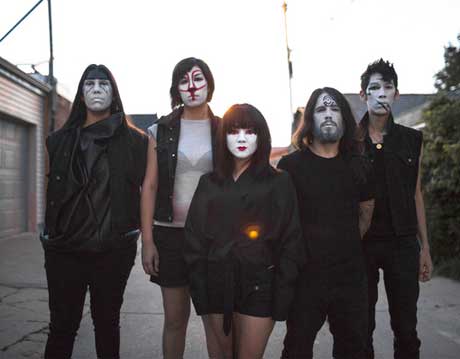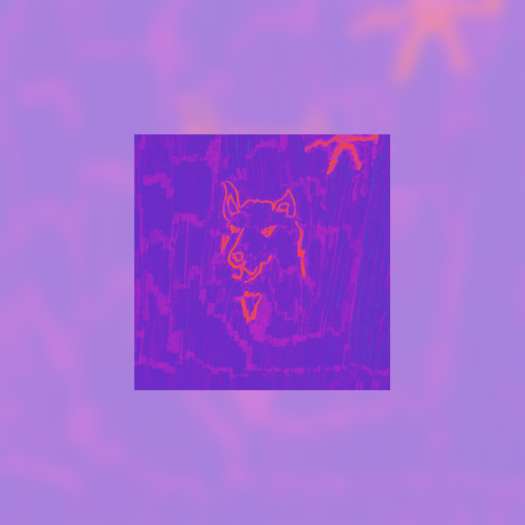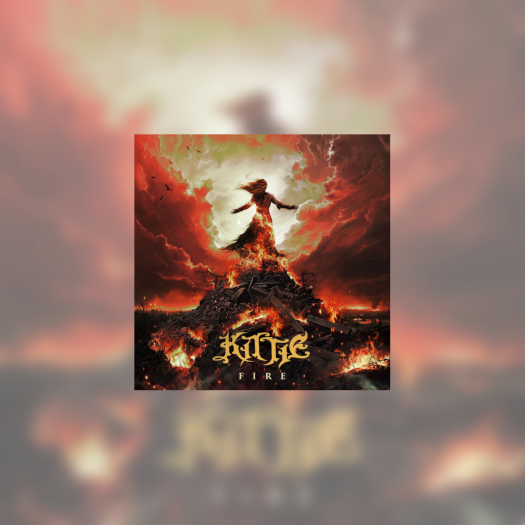"Hey, are you this weird and nerdy kid of colour hiding in a basement and have trouble relating to the world?" This is Yamantaka // Sonic Titan's call for likeminded fans who share a sense of isolation and yearning for community. The art collective know that they're not your traditional rockers. They often perform in elaborate costumes and makeup, they stir a melting pot of unusual and varied genres, and above all, they deliver this music through mythologized narratives.
"I don't want to be Zack de la Rocha; I don't want to say blatant, political things somebody else has already said," producer and core member Alaska B explains. "I just think, to do the classic singer-songwriter, centering yourself around the lyrics thing, there's an ego stroke going on. Being a Buddhist, it's important to speak in metaphor and parables sometimes. Mythology is not what life is like either, but I can paint a more interesting fucking picture with that imagery."
Dubbing themselves a "noh-wave" band who fuse metal and noise rock riffs, operatic flares, J-pop and Chinese influences, Yamantaka // Sonic Titan take on many challenges. And for a band who take on a plethora of identities, the Toronto/Montreal act have learned to "cut the fat" on their new album, UZU.
Distilling their elaborate rock opera 33 — a theatrical piece the band have performed a few times in the past couple of years — into what Alaska B describes as a soundtrack to a rock opera, their follow-up to 2012's Polaris Music Prize shortlisted debut, YT//ST, is an ambitious feat, but one that has continued to teach the band how to craft an album.
Singer Ruby Kato Attwood says emotion factored into filtering down the track list. "We need to make it the best that we can make it and it's okay to throw something out even if you've worked on it forever," Attwood offers. "It's just more work to force it and it's not a good feeling."
UZU's resulting odyssey of mythological narratives follows the nautical theme of feeling lost and adrift in a world. Extracting chunks from 33 as well as incorporating songs new and old ("Hall of Mirrors" dates back to the band's original songwriting team, which featured Dirty Beaches' Shub Roy), this album has been curated to evoke the same strong imagery Yamantaka // Sonic Titan became known for on their debut while still adhering to their intricate sound.
And even though UZU translates tales via fictional characters, such as one of the album's central figures Mazu, Chinese goddess of the sea ("mazu" also loosely translates to whirlpools), the band draw from personal experiences and perceptions to write lyrics.
"For me, this album is about the moments of being lost and not being camouflaged anymore," Attwood says. "It's kind of an abstract approach, but through myths, we can explore how much is known and how much is unknown about these characters. They're sort of going into these deep waters and there are things that they're sure of, things they can hold on to, but then there are these vast unknowns. We want to explore the unknown."
"I don't want to be Zack de la Rocha; I don't want to say blatant, political things somebody else has already said," producer and core member Alaska B explains. "I just think, to do the classic singer-songwriter, centering yourself around the lyrics thing, there's an ego stroke going on. Being a Buddhist, it's important to speak in metaphor and parables sometimes. Mythology is not what life is like either, but I can paint a more interesting fucking picture with that imagery."
Dubbing themselves a "noh-wave" band who fuse metal and noise rock riffs, operatic flares, J-pop and Chinese influences, Yamantaka // Sonic Titan take on many challenges. And for a band who take on a plethora of identities, the Toronto/Montreal act have learned to "cut the fat" on their new album, UZU.
Distilling their elaborate rock opera 33 — a theatrical piece the band have performed a few times in the past couple of years — into what Alaska B describes as a soundtrack to a rock opera, their follow-up to 2012's Polaris Music Prize shortlisted debut, YT//ST, is an ambitious feat, but one that has continued to teach the band how to craft an album.
Singer Ruby Kato Attwood says emotion factored into filtering down the track list. "We need to make it the best that we can make it and it's okay to throw something out even if you've worked on it forever," Attwood offers. "It's just more work to force it and it's not a good feeling."
UZU's resulting odyssey of mythological narratives follows the nautical theme of feeling lost and adrift in a world. Extracting chunks from 33 as well as incorporating songs new and old ("Hall of Mirrors" dates back to the band's original songwriting team, which featured Dirty Beaches' Shub Roy), this album has been curated to evoke the same strong imagery Yamantaka // Sonic Titan became known for on their debut while still adhering to their intricate sound.
And even though UZU translates tales via fictional characters, such as one of the album's central figures Mazu, Chinese goddess of the sea ("mazu" also loosely translates to whirlpools), the band draw from personal experiences and perceptions to write lyrics.
"For me, this album is about the moments of being lost and not being camouflaged anymore," Attwood says. "It's kind of an abstract approach, but through myths, we can explore how much is known and how much is unknown about these characters. They're sort of going into these deep waters and there are things that they're sure of, things they can hold on to, but then there are these vast unknowns. We want to explore the unknown."



